Ever wanted to be the next indie developer behind an overwhelming hit like Cuphead, Stardew Valley, or Undertale? A brilliant idea is just the starting point, and having the right software tools is key for bringing your world to life. But with so many game engines and frameworks out there, like Unity, Phaser, GameMaker, and Godot, how do you even choose?
In this article, we’ll break down the best software for 2D game development, explaining their core advantages and giving some examples of games created with them. You will also learn how versatile, all-purpose behemoths like Unity differ from focused frameworks tailored for smaller projects, like Phaser.
Let’s get started!
What is the best software for 2D game development?
With a thriving ecosystem of game engines and frameworks, there are advantages and disadvantages to every option. An all-purpose software will provide the most features, but it won’t necessarily be the optimal choice for specific game genres. On the other hand, smaller frameworks might be a treat to work with, offering great performance and simplicity at the cost of scalability.
In short, there is no one-size-fits-all solution, and evaluating multiple options is crucial. Let’s explore some of the best software for 2D game development below.
Unity
Unity is currently the most popular game engine for both 2D and 3D games on itch.io and is usually the preferred choice of most mobile game developers. With its user-friendly interface, extensive documentation, varied asset store, thousands of community-created resources to help newcomers get up to speed, and cross-platform compatibility, Unity has a lot to offer for hobbyists and professionals of all levels.
While the game engine has numerous features geared towards the development of 3D games, Unity is also a robust option for 2D games. Its flexible component architecture, efficient physics system, optimized rendering capabilities, and tools like the tilemap editor help streamline 2D game development workflows.
In fact, many popular 2D indie games have been created with Unity – like Cuphead, one of the most beloved game titles released in 2018, Hollow Knight, which features gorgeous hand-drawn art all over the game, and Dead Cells, a metroidvania roguelite featuring souls-lite combat mechanics, each of those receiving critical acclaim from gamers worldwide.
Getting started with Unity is free, but you have to purchase a premium license once your revenue in the past 12 months surpasses $100,000.
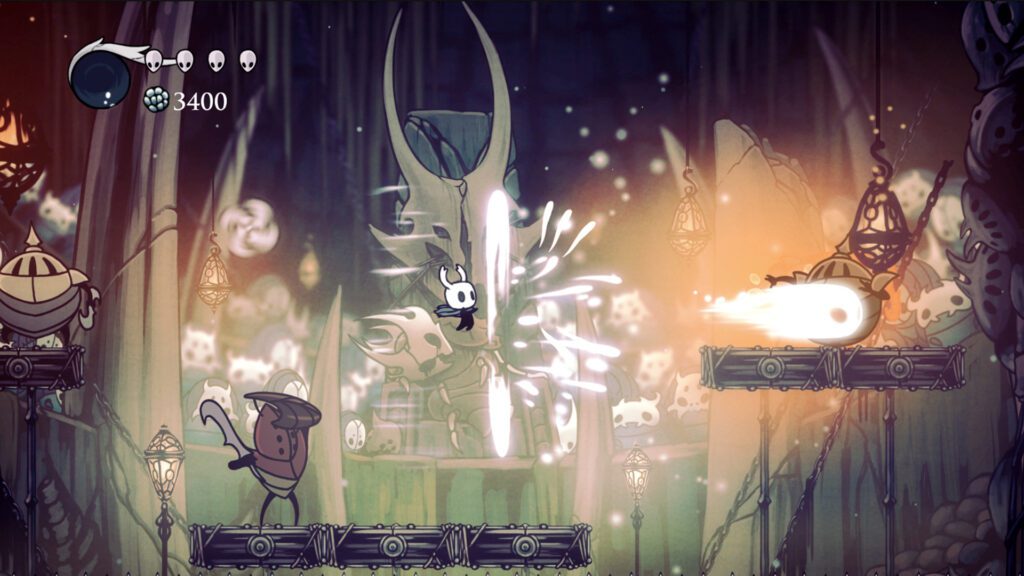
Godot Engine
Godot Engine is completely free and open-source software (FOSS) that has grown in popularity over the last few years, especially among indie developers. Designed to be flexible and modular, Godot brings a node-based architecture and supports multiple programming languages, like C#, C/C++, and GDScript. And, thanks to community efforts, it supports even other popular languages such as Lua and Python.
Like with Unity, it’s possible to create both 2D and 3D games with Godot, which has native tools for creating tilemaps and total support for 2D collisions, lighting, and more. It also exports games to all major desktop and mobile platforms, thus being a versatile game engine and a solid choice for developers of all skill levels – which is also completely free!
Notable 2D games created with Godot include Hyper Light Drifter, Brotato, Wrought Flesh, Lumencraft, and Gravity Ace.
GameMaker Studio 2
With a legacy dating back to 1999, GameMaker Studio 2 is the latest iteration of this iconic game engine specifically designed for 2D games.
While not packed with features like Unity and other major players in the industry, GMS2’s toolset streamlines creating and iterating on 2D games: its drag-and-drop workflow (also known as visual programming) makes it accessible for beginners and a great choice for those looking to build a quick prototype of their game. For those looking to add more complex functionalities to their games, GMS2 has its own JavaScript-based language, GameMaker Language (GML).
This 2D game development engine comes with affordable pricing and lets you export games to a variety of different platforms, like PC, Nintendo Switch, Xbox, PlayStation, and even Opera GX’s browser games repository.
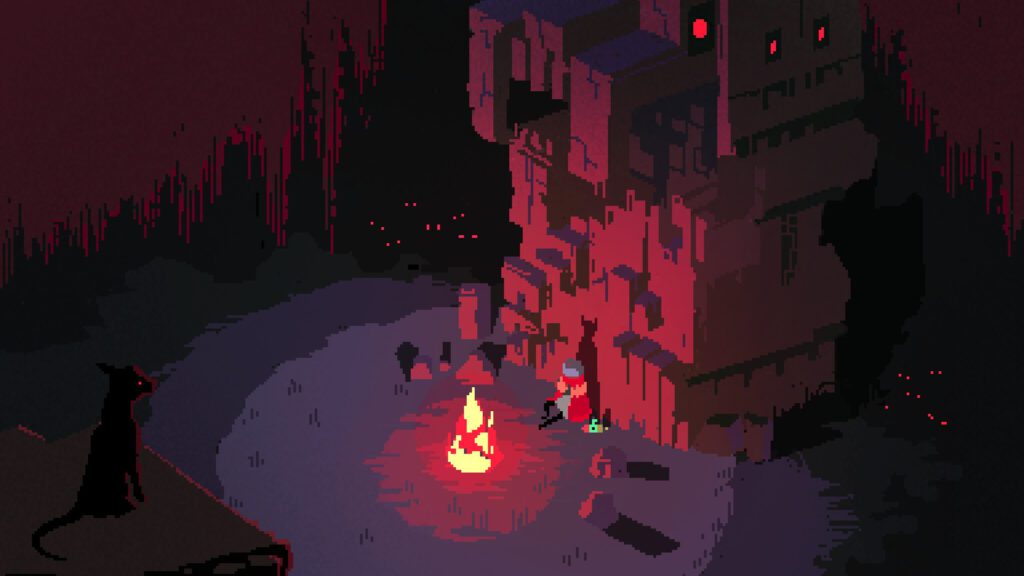
Solar 2D
Formerly known as Corona, Solar 2D is a fully open-source framework specifically designed for building 2D games and software. This engine is similar to Godot in that it’s completely free – there are no hidden fees or royalties along the way. Also, it uses the Lua scripting language, known to be very accessible and easy to learn, to handle game logic and behavior, but it’s also possible to use more popular languages like C++ and Java.
Other perks include a physics simulation engine, which is tailored for 2D, a built-in UI framework, numerous APIs for audio, touch inputs, graphics, and integration with other platforms. The community, albeit smaller, is very active and helpful, the documentation is divine, and the framework itself is straightforward, but might feel too barebones at times.
Nonetheless, it’s a solid choice for beginners and veterans alike. Some games made with Solar 2D include Supertype, Coromon, and a franchise called Tim the Fox.
Stencyl
Devised with simplicity in mind, Stencyl is a beginner-friendly 2D game development software that takes huge inspiration from MIT’s Scratch, which also uses visual, drag-and-drop block-based coding instead of traditional text-based programming.
It also comes with a swathe of pre-programmed behaviors and templates for common game genres, such as 2D platformers, RPGs, and even simple adventure games. In turn, this allows developers to modify the pre-built templates rather than coding everything from the ground up, saving a lot of time and allowing them to focus on other areas of game development, such as design, asset creation, and marketing.
However, this simplicity should be treated as a double-edged blade: compared to more robust engines, like Unity and Godot, Stencyl might feel very constrictive. But for those looking for ease of use and willing to learn how to implement game logic through a visual, intuitive interface, you can’t go wrong with this game engine. It’s important to note that Stencyl’s free version is very limited, and its prices start at $99 a year.
Some notable games made with this game engine include Mibibli’s Quest and Super Dangerous Dungeons.
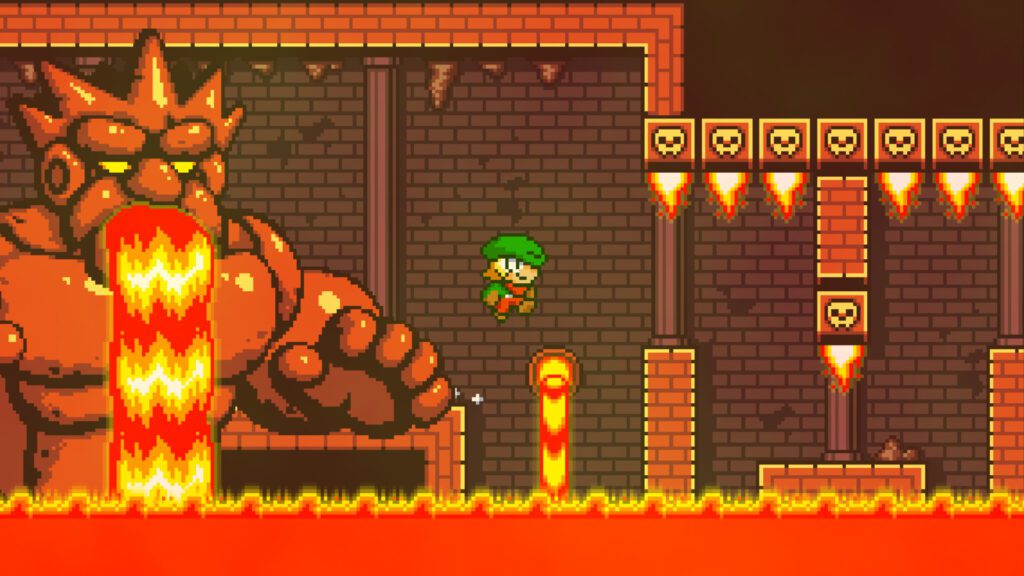
Ren’py
Have you ever wanted to create your own visual novel? With Ren’py, you can! This open-source visual novel engine is built on Python and is geared towards the development of text-based games with branching narratives and interactive fiction.
Their focus is on making it easy to tell a captivating story and create dynamic visual novels with little programming skills required. Also, with Ren’py, developers can take advantage of Python’s libraries and features to generate content procedurally. This can greatly enhance the depth of a visual novel by adding random elements to the story, which further increases its replayability.
While not a versatile game development software like most in this list, Ren’py is a powerful framework tailored specifically for visual novels – and a great one at that. It’s the technology behind popular games like Doki Doki Literature Club, Andromeda Six, and Butterfly Soup.
RPG Maker
First launched in the early 90s, RPG Maker has since established itself as a game engine specialized for developing role-playing games. It provides an accessible toolkit and templates for common mechanics found in these titles, allowing developers to create RPGs without coding. Also, developers can modify pretty much all game assets, storylines, and rules through RPG Maker’s intuitive editor and visual tools.
Once more, simplicity serves as a double-edged sword: despite lacking the flexibility for developers wanting to bring more varied ideas to life, RPG Maker is incredible for streamlining the development of turn-based 2D RPGs. It also sees use for testing prototypes and concepts without intensive programming.
Notable titles created with RPG Maker include OneShot, Omori, Nepenthe, and Grimm’s Hollow.
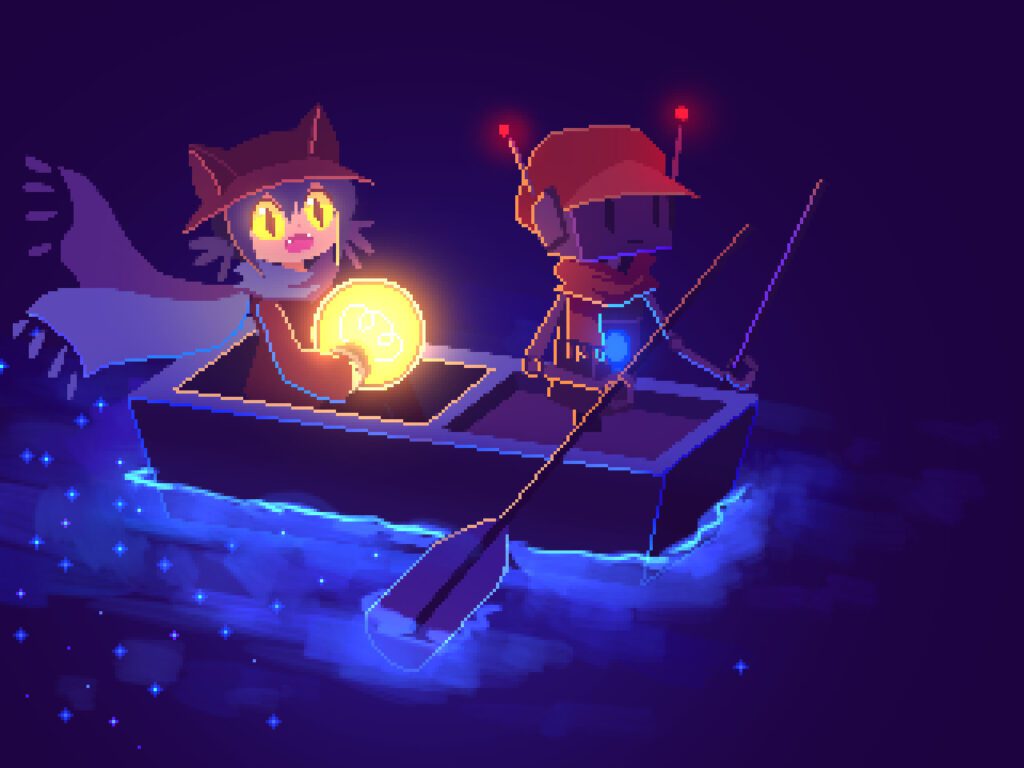
Other frameworks
While fully-fledged game engines provide the most robust tools for developing 2D games, it’s also possible to use more lightweight frameworks for specific use cases! They can act as the foundation on top of which games are built without the complexity of your usual game engine.
For example, Phaser is a popular open-source HTML5 + JavaScript or TypeScript framework. It provides modules like a physics engine and a particle system that is geared for web-based projects that require speed and simplicity. Still, it’s possible to create engaging and critically-acclaimed games like Vampire Survivors with it.
Similarly, Three.js is a 3D framework that can be leveraged for building incredibly performant 2D games for browsers while taking advantage of its 3D features, like shaders and advanced lighting. LÖVE is another game development framework that uses the flexible and easy-to-learn Lua language, delivering a powerful set of tools that is perfect for quick iterations of game concepts.
All in all, while not rich in features like the most popular game engines, opting for a framework smaller in scope is a perfectly viable route for simpler projects with clear technical requirements, like prototyping different 2D games as fast as possible.
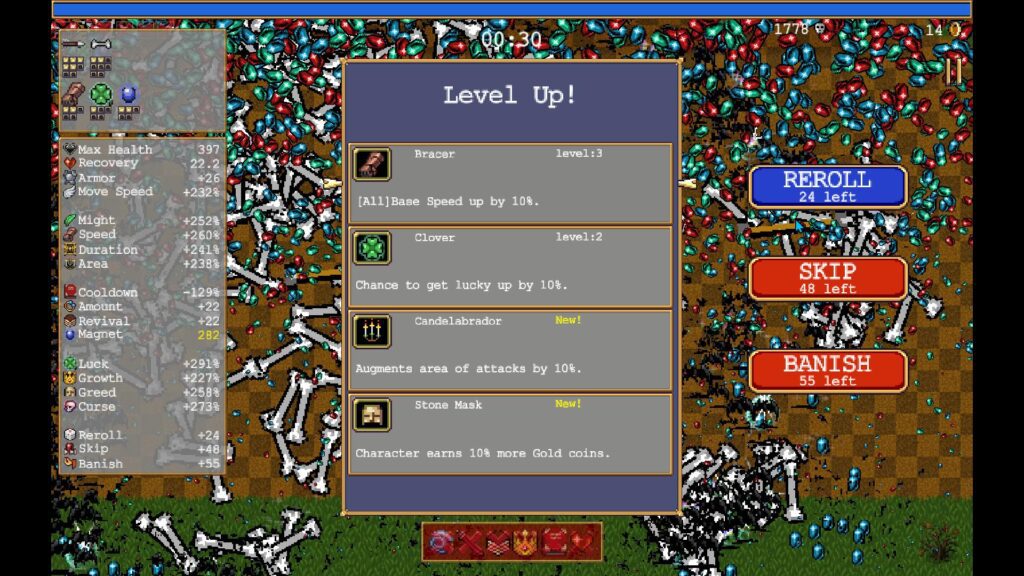
When it comes to game development, choosing the right software is crucial for bringing your ideas to life. Whether you’re a novice game designer embarking on your first game project or an experienced indie game developer looking for the best tools for your next endeavor, selecting the best game engine for making 2D games is paramount.
In 2024, the landscape of game development tools offers a diverse range of options, from simple 2D game engines to robust open-source platforms. As you delve into making a game, you’ll want software that not only caters to your specific needs but also empowers you to craft any game you desire.
The best game development software not only covers all available game design software in this article but also provides collaborative game design documentation, facilitating seamless integration into your game.
Conclusion
Overall, evaluating the best software for 2D game development is something best done only by you. It requires careful consideration of your technical requirements, skills, preferred workflows, and project goals. For example, we know that Unity is the most popular, so it’s naturally going to be the one with the largest number of available resources, but do you really need all of its features?
Also, remember that implementing the logic of a game is only half the battle in game development. To bring your ideas fully to life, assets like sprites, particle effects, illustrations, soundtrack, and even the interface design must be added.
Some engines offer asset stores to purchase these components while open-source options rely on communities of artists. Outsourcing custom assets is an option too! So remember to budget time and resources for filling out these essential elements that bring polish and personality to any game – 2D or otherwise!
Or, better yet, what about leaving all the work in the hands of a reputable game development studio? At Main Leaf, we are experts in all things game development, and we can create your game from the ground up with Unity or Unreal Engine. Whether you need a simple educational 2D game or a fully-featured 3D game with blockchain integration, we’ll be glad to lend you a hand!
Interested in partnering with us? Get in touch below to start the development of your upcoming masterpiece!

